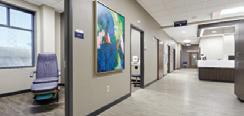
7 minute read
Health Care
| HEALTH CARE | Area so far immune to worker shortage
BY SCOTT NUNN
Since the start of the COVID-19 pandemic, hospital capacity has been a top concern for officials plotting a response. And capacity is not just the number of beds – hospitals need adequate equipment and supplies and, most important, they need the workers who provide the care.
While certain areas of the U.S. have experienced both space and staff shortages during the pandemic, the current surge in cases is beginning to strain hospitals nationwide, federal health officials say.
Wilmington-area hospitals have not had any major worker shortages during the pandemic, officials said.
But the situation is different elsewhere. The U.S. Department of Health and Human Services reported recently that more than 1,000 hospitals across the nation are “critically” short on staff. That is about a fifth of the hospitals that report staffing levels. And with cases still spiking, some hospitals that so far are getting by have reported that they expected to face similar shortages in the coming weeks.
There are many factors behind the shortage, officials say. Heavy patient loads directly related to the virus, workers who are infected or have been exposed and those needing to help children who are out of school are a few.
Even before the pandemic, staffing already was challenging in some areas. Not only does the aging population require more care, the healthcare workforce itself is aging.
The most critical shortages are in hard-hit North Dakota and Wyoming, but Virginia also is struggling to keep hospitals staffed.
The news is much better in North Carolina. While 51% of hospitals in North Dakota report a critical shortage of workers, that number in North Carolina is 4%, nearly equaling the 3% in Kentucky – the state with the fewest hospitals reporting shortages.
Locally, there have been no worker shortages at New Hanover Regional Medical Center, according to West Paul, chief clinical officer.
“So far, NHRMC has been fortunate in that we have seen lower infection rates among staff compared with our peers statewide and even nationally,” Paul said, adding that leaders closely track staffing trends and can respond as necessary.
“I commend our staff and providers for diligently following safety precautions, not just at work, but outside of our four walls,” he said. “We continue to stress the importance of masking and other safety precautions to limit the spread, particularly as we expect the numbers to increase over the winter months.”
Like many other large health-care facilities, NHRMC regularly employs temporary workers – some known as “traveling nurses” – to ensure staffing levels are met. NHRMC also offers sign-on/incentive bonuses as needed for hard-to-fill positions.
Rural areas across the nation have had a harder time keeping jobs filled. Pender Memorial in Burgaw, which is operated by NHRMC, has had some periodic shortages on some shifts since the start of the pandemic.
“The hospital has turned to travel contract staff and offered overtime pay to existing staff to fill the gaps,” Paul said. “Managers have also helped provide staffing coverage.”
Brunswick Medical Center in Bolivia also is faring as well as its owner, Novant Health, which is expected to finalize its purchase of NHRMC in early 2021.
“At a system level and at Novant Health Brunswick Medical Center, we have not and are currently not experiencing any team-member shortages,” said Novant spokeswoman Kristen Barnhardt.
Barnhardt said Novant is taking extensive steps to ensure its workforce is taken care of during the pandemic, including donating $11 million to establish a disaster relief fund for employees, offering free and subsidized emergency child care and providing overnight accommodations for nurses who have dependents living at home who fall into high-risk categories.

founded in 1961 as a general contractor and real estate developer



#34 ENR Ranking for Southeast Top Contractors


17-year award-winner of NC Dept. of Labor Gold Safety Award



Robust MWBE Program for minority participation and mentorship on projects

Building Structures. Building Relationships.
New foundation will be one of state’s largest
It won’t be fully funded until Novant Health’s purchase of New Hanover Regional Medical Center becomes final, but the board that will oversee a $1.25 billion endowment is already getting the foundation going.
Although as of press time it was waiting for the appointment of six of its 11 members, the New Hanover Community Endowment Inc. is up and running. The five board members already appointed are working on administrative tasks for the newly formed organization, which, overnight, will become one of the largest charitable funds in North Carolina. (The $3.8 billion Duke Endowment is the largest).
Five of the board’s 11 members were appointed by the New Hanover County commissioners as part of the Oct. 5 vote approving the sale. The remaining six will be appointed by a new 17-member board of managers that will oversee NHRMC under Novant’s ownership.
If the $5 billion deal passes regulatory scrutiny, it is expected to close in early 2021. When it does, $1.25 billion – the bulk of the cash proceeds – will go into the endowment meant, which, according to its articles of incorporation, was established “exclusively for charitable, scientific or educational purposes … including supporting public health needs and social welfare projects in New Hanover County.”
To bridge the gap, the county commissioners approved a $100,000 loan to the foundation to cover expenses prior to the closing.
Novant Health raises minimum wage to $15
More than 2,000 Novant Health employees will get a pay raise in January when the Winston-Salem-based health care system raises its minimum wage from $12.50 per hour to $15 per hour. North Carolina’s minimum wage is $7.25.
The private, nonprofit health network has 30,000 employees at its locations, most of which are in North Carolina, including Brunswick Medical Center in Bolivia. With its pending purchase of New Hanover Regional Medical Center, Novant will be adding 7,000 employees to its workforce.
“Novant Health is dedicated to caring for our communities, starting with our own team members,” said Carl Armato, Novant Health president and CEO. “Though we’ve adjusted our living wage over the past several years, we recognized an opportunity to further invest in our team members to ensure they have the resources they need to live and thrive in the communities we serve.”
“This update to our living wage represents a $4.3 million investment in our team members,” said Carmen Canales, senior vice president and chief human resources officer. “We believe that offering a living wage improves the economic mobility of our team members and reinforces our commitment to attract and retain the best people to carry out our mission to improve the health of our communities, one person at a time.”
Popular UNC partnership expanded to elsewhere
Novant Health is expanding its alliance with UNC Health and UNC School of Medicine, a partnership the health-care system first entered as part of its successful bid to purchase New Hanover Regional Medical Center.
The UNC addition appeared to be an important factor in helping Novant edge out Duke Health and Atrium Health, the other two finalists. Several members of the group that guided the sale exploration said pulling in UNC was a deal-closer for Novant.
Now Novant is expanding the partnership, with UNC Health and UNC School of Medicine expanding medical education, research and clinical services to other North Carolina locations, including Novant facilities in Mecklenburg, Forsyth and other counties. The new partnership also will focus on finding innovative solutions to enhance care in rural areas, according to a joint news release from the three organizations.
The partnership will initially locate a UNC School of Medicine branch campus at Novant Health Presbyterian Medical Center in Charlotte. In addition, expansion of UNC School of Medicine’s Kenan Primary Care Medical Scholars Program will train more students to work in rural and under-resourced communities with enhanced training for care in those communities across North Carolina, the news release said.

THE BEST CARE AT THE BEST VALUE


Since 1971, Wilmington Health has been committed to the care and health of Southeastern North Carolina, providing reliable experts, innovative solutions and the best value for our patients. When it comes to you and your family, count on TRUE CARE from Wilmington Health.





